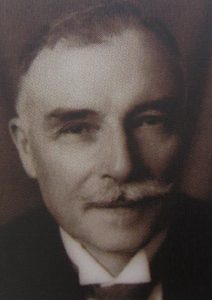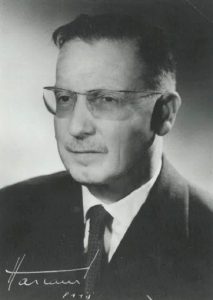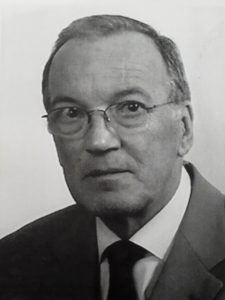The School of Chemistry in Rennes was founded in 1919 at the initiative of the Chamber of Commerce as part of the Polytechnic of Brittany, later the Polytechnic of the West. The first intake of engineers graduated in 1921, and went into metallurgy and mining as well as the food industry. The creation of the Rennes Institute of Chemistry resulted from a collaborative effort with the Faculty of Sciences which was to become the ICUR (Institute of Chemistry of the University of Rennes).
In 1954,
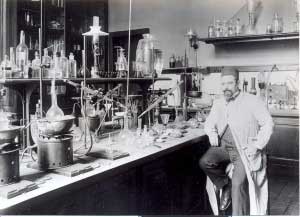 Laboratoire en 1919
Laboratoire en 1919In 1959, the ICUR obtained authority to issue engineering degrees and rose to the status of a national higher engineering college (ENSI). In 1967, the ENSCR moved onto the Rennes Beaulieu campus in premises shared with the department of Chemistry of the IUT of Rennes, which prevented it from controlling its own development, and educational independence.
In 1986,
the school obtained the status of Public Administrative Body (EPA – article 43 of the law of 26 January 1984) attached to the University of Rennes 1 and governed by the decree of 14 March 1986. On the basis of favourable reports from the CTI and the recommendations of the Industrial Chemistry Society, the ENSCR successively obtained
From 1988 onwards,
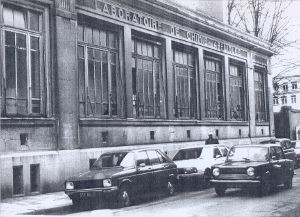 L'ENSCR Rue Kleber
L'ENSCR Rue Kleberthe staff and financial resources that enabled it to win its educational independence, to create and develop its research laboratories, to diversify its range of training by setting up in 1993 the Foundation Course (CPI) of the Gay-Lussac Federation and later the Chem.I.St. international foundation course from the autumn of 2002; to develop common services to sustain its assets and to encourage interaction between initial training and research, and thus the relationship between users, teachers and IATOS staff.
Since 2007,
the ENSCR has been a founder member of the “European University of Brittany” higher education and research cluster. In 2008 and again in 2014, the ENSCR obtained the renewal for 6 years (maximum period) of its authority to issue engineering degrees by the Engineering Qualifications Committee (CTI). The engineering diploma is also recognised by EUR-ACE which means that the training given at the school meets the quality criteria recognised throughout Europe. The school is also jointly accredited to issue PhD degrees with the “Material Sciences” Doctoral school.
Finally, in June 2014,

the ENSCR opened a new building, the Chemical Engineering Centre (PIC), in the presence of the Minister for Defence, Jean-Yves Le Drian, providing the region with a technological platform for development purposes.
Dates
The Institut Polytechnique de Bretagne (IPB) founded by the Chamber of Commerce
The Institute of Chemistry founded at the University of Rennes (ICUR)
Accreditation by the CTI (Engineering degrees board)
Accepted as a member of the Ecoles Nationales Supérieures d’Ingénieurs (ENSI)
Moved to the present site on the scientific campus at Rennes Beaulieu
Obtained the status of Etablissement Public à Caractère Administratif (EPA)
Created the Fédération Gay-Lussac’s integrated foundation course
Created the Fédération Gay-Lussac Chem.I.St international course
Accredited to award the master’s degree in «Science and Technology», chemistry option
ENSCR became a founder member of the Research and Higher Education group «Université Européenne de Bretagne» (UEB)
Jointly accredited with the Rennes “Material Sciences” Doctoral School : accreditation to award Doctorates
Created the preparatory term – SPI -for foreigners students
Renewal of accreditation from the Engineering Qualifications Committee (CTI) and inauguration of the Chemical Engineering Centre
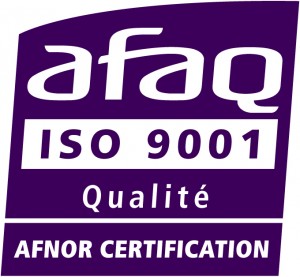 July 2015: ENSCR is ISO-certified 9001. This certification recognizes the efficiency and the quality of the training, the research and the general functioning of the school.
July 2015: ENSCR is ISO-certified 9001. This certification recognizes the efficiency and the quality of the training, the research and the general functioning of the school.
September 2015: obtaining of the label ” Health and Safety in the work “
In July, Régis Gautier is appointed director of the ENSCR. He succeeds Pierre Le Cloirec, who has been in charge of the school for 10 years.
In September, the ENSCR obtains the renewal for 3 years of the ISO 9001 certification.
The ENSCR celebrates its 100th anniversary. Throughout 2019, numerous events were organized, starting with the conference appearance of the 2016 Nobel Prize in Chemistry, Jean-Pierre Sauvage. A major chemistry competition was also organized for high schools in Brittany. The school also had the honor of receiving Hervé This in a conference and then he led workshops with the 1st year engineering students. In May, the school opened its doors to families and children by organizing a fun afternoon of discovery of chemistry thanks to students who led workshops and which was a real success. At the end of the year, a big meal on the theme of Brittany was organized for students and staff.
2020
In 2020, creation of the CITI training course accessible for baccalaureate graduates from an STL technological baccalaureate. This new Integrated Cycle Tremplin Engineer training is intended for STL baccalaureate graduates (SPCL mention) for the Chemistry and Chemical Engineering Schools of the Gay Lussac Federation (FGL). At the heart of an engineering school and without equivalent among the training offers, CITI is a 2-year course which constitutes a real springboard to engineering professions for high school students with a technological baccalaureate. This class opens a new opportunity to this new audience with privileged access to chemical engineering training and diploma.
The University of Rennes 1, the School of Advanced Studies in Public Health (EHESP), the National School of Chemistry of Rennes (ENSCR), the École Normale Supérieure of Rennes (ENS Rennes), the National Institute of applied sciences of Rennes (INSA Rennes) and Sciences Po Rennes approved at the beginning of October, by decision of their respective boards of directors, the statutes of the University of Rennes, a new higher education and research establishment which will see the light of day on January 1, 2023. This marks both the culmination of a dynamic of rapprochement begun in 2017 with the UniR project and a new starting point, due to its status as an experimental public establishment.
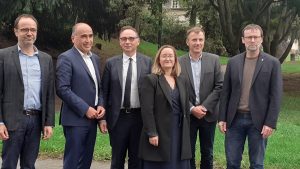
Creation on January 1, 2023 of the University of Rennes under the status of EPE, experimental public establishment. This new establishment brings together the former University of Rennes 1, the School of Advanced Studies in Public Health (EHESP), the ENSCR, the École Normale Supérieure de Rennes (ENS Rennes), the National Institute of Applied Sciences of Rennes (INSA Rennes) and Sciences Po Rennes. This is the culmination of a rapprochement dynamic begun in 2017 with the UniR project.
 July 1, 2023 : new director Audrey Soric takes office. She succeeds Régis Gautier who managed the establishment for 5 years.
July 1, 2023 : new director Audrey Soric takes office. She succeeds Régis Gautier who managed the establishment for 5 years.
Directors since 1919
